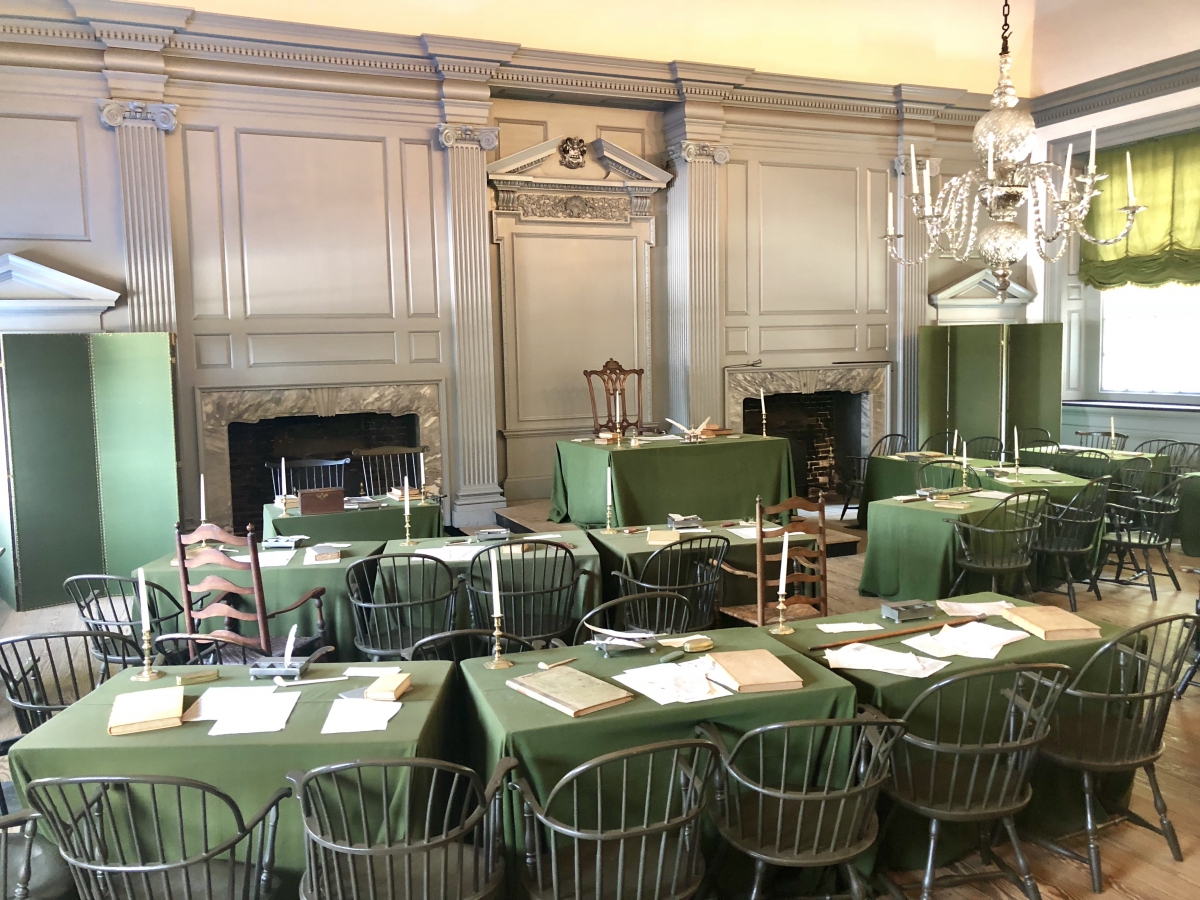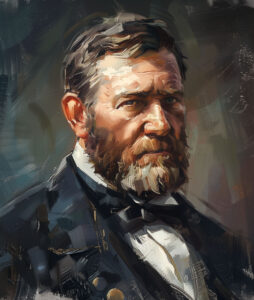Oddities from a private 1787 meeting that created the United States of America we’ve come to know
The 55 men assembled in the summer of 1787 in a first-floor room of the Pennsylvania State House faced a formidable task. Under the Articles of Confederation, the government of the United States of America had proven weak and ineffective. Americans needed something different; what that something was up to the 55. After 88 working sessions, endured for four sweltering months in the old building on Chestnut Street, a few blocks west of Philadelphia’s Delaware River waterfront, the answer was: the U.S. Constitution.
Americans venerate the delegates to the Constitutional Convention as visionaries acting under almost divine inspiration to draft a masterpiece cementing “a more perfect Union.” That notion would have had the participants scoffing. “Reason tells us we are but men,” delegate Gouverneur Morris of Pennsylvania told the convention, “and we are not to expect any particular interference of Heaven in our favor.”
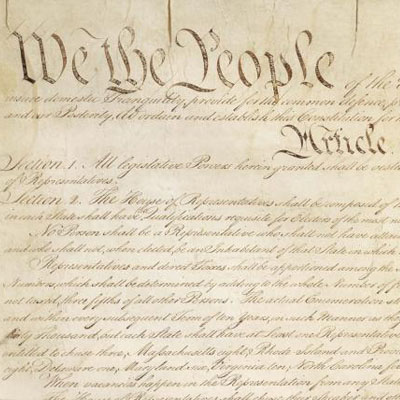
Those 88 sessions resonated with attitudes and expressions jarring, even shocking. Many more concepts floated among delegates than appear the final document. Some of those ideas ring preposterous; others hint at what might have been. Delegates postured and thundered, often disagreeing—the record notes 569 votes on motions, proposals, and drafts as the convention came to the consensus. The clangor that produced the Constitution bears scrutiny no less than the document itself.
On February 21, 1787, Congress asked the 13 states to send delegates to the Convention; 12 states complied. Rhode Island, long ago nicknamed Rogue’s Island for its puckish sense of independence, did not participate. There were to be 74 delegates, some of them household names: Virginians George Washington and James Madison; Pennsylvanian Benjamin Franklin, New Yorker Alexander Hamilton. One of the new nation’s ablest statesmen was across the Atlantic. Thomas Jefferson, author of the Declaration of Independence, was in Paris as America’s minister to France. Those in attendance were their country’s best and brightest—in Jefferson’s phrase, “an assembly of demigods.” Madison called them “the most respectable characters in the U.S.” and “the best contribution of talents the States could make for the occasion.”
Of 74 appointed delegates, only 55 made it to Philadelphia. They ranged in age from Franklin, 81, to Jonathan Dayton, 26, of New Jersey. Their trades included lawyer, merchant, physician, and planter; 31 had attended college, 30 had served in the Revolution, 42 in the Continental Congress. Eight had signed the Declaration of Independence, and seven had been governors of rebel colonies or states. Above all, the gentlemen in Philadelphia that summer were, historian Joseph J. Ellis wrote, “a muster of veteran politicos set on closing a deal.”
Awaiting the requisite seven-state quorum, the Convention, scheduled to start May 14, did not begin until Friday, May 25. By the September 17 signing, only 42 delegates were still on hand, the rest having skipped town. Only Madison attended every session—missing, he boasted, not “a single day, nor more than a casual fraction of an hour in any day.”
The Constitution is “the supreme Law of the Land,” but is it legal? In ordering the Constitutional Convention, Congress authorized delegates only to meet “for the sole and express purpose of revising the Articles of Confederation.” Instead, participants exceeded their authority, scrapping the Articles and creating a new form of government—a power-grab delegate William Paterson of New Jersey flagged. Assigned only to amend the Articles, delegates “ought to keep within its limits, or we should be charged by our constituents with usurpation,” Paterson argued. “The people of America were sharpsighted and not to be deceived.”
Paterson’s colleagues did not agree. “We have powers to conclude nothing,” James Wilson of Pennsylvania reasoned. “We have powers to propose anything.” Other delegates gave not a fig for limitations. “There are great seasons when persons with limited powers are justified in exceeding them,” said Edmund J. Randolph of Virginia, “And a person would be contemptible not to risk it.” Hamilton said the delegates’ assignment was to repair the defective Articles, and to “rely on & propose any plan not adequate to these exigencies, merely because it was not clearly within our powers, would be to sacrifice the means to the end.” The document that created a government of laws, not men, began by blinking a blind eye at the law.
“We the People,” begins the Preamble, suggesting deep faith in the common man and woman. However, many delegates distrusted the people and feared what an excess of democracy might mean. Once the Convention decided the government would have an executive and a legislature of two houses, delegates had to decide who should choose that leader and the members of those bodies. The simplest mechanism was direct election—a prospect terrifying to some delegates, like Elbridge Gerry of Massachusetts. “The evils we experience flow from the excess of democracy,” said Gerry. “The people do not want virtue; but are the dupes of pretended patriots.” Gerry was speaking from home-state experience. “The worst men get into the Legislature,” he said. “Several members of that Body had lately been convicted of infamous crimes.” Roger Sherman of Connecticut agreed. The people, Sherman said, “should have as little to do as may be about the Government.”
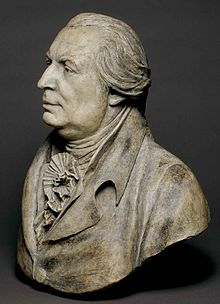
The problem, skeptics said, was the ease with which the masses could be hornswoggled. “The people cannot know & judge of the characters of Candidates. The worse possible choice will be made.” John F. Mercer of Maryland said. Gerry concurred. “Men of indigence, ignorance & baseness, spare no pains however dirty to carry their point agst. men who are superior to the artifices practiced,” the Massachusetts delegate said.
Give the people least some voice, pleaded some delegates. “The people will be represented; they ought therefore to choose the Representatives,” said George Mason. Fellow Virginian James Madison sought “an election of one branch at least of the Legislature by the people immediately, as a clear principle of free Govt.”
Delegates did allow a modicum of democracy. Voters could elect members of the House of Representatives—but not senators or the executive. An electoral college would select the president; state legislatures would choose senators—until 1913, when the 17th Amendment instituted direct election of members of the U.S. Senate. Gerry, that foe of the directed vote, figured out how to make it work for him. In 1812, as his state’s governor, Gerry, needed to give his party an election-day edge in Massachusetts. He oversaw the redrawing of voting districts, which came to be called gerrymandering.
Some delegates moved to restrict suffrage to landowners. Propertied persons, argued John Dickinson of Delaware, are “the best guardians of liberty.” Dickinson predicted that “the restriction of the right to them as a necessary defence agst. the dangerous influence of those multitudes without property & without principle, with which our Country like all others, will in time abound.” Morris feared the landless would sell their votes “to the rich who will be able to buy them.”
Not every delegate felt this way. “We shd. not depress the virtue & public spirit of our common people,” Franklin urged. Madison took a realistic tack. Deny ordinary citizens the vote, he said, and “the people would be lost sight of altogether; and the necessary sympathy between them and their rulers and officers, too little felt.” There is “no right of which the people are more jealous than that of suffrage,” said Pierce Butler of South Carolina. Delegates left it to each state to set voter qualifications—a practical solution because, said Wilson, acknowledging that it would be “very hard & disagreeable” to bar people from voting in federal elections when they could vote in state elections. For citizens without wealth, that victory was Pyrrhic. Of the 13 states, 10 tied suffrage to minimum property ownership, ranging from 50 pounds’ worth of property of any type to 50 acres of land.
Through the deliberations, mum was the word. Delegates began by deciding that “nothing spoken in the House be printed, or otherwise published, or communicated without leave”—a self-imposed gag order participants took seriously despite Philadelphia’ fetid summer. The Convention meeting room was, according to Paterson, “the warmest place I have ever been in.” The State House, now known as Independence Hall, had large windows that could have provided ventilation. However, to discourage snooping, delegates kept the windows shut. When an unnamed delegate let a document stray, Washington, the Convention’s president, scolded all hands: “I must entreat Gentlemen to be more careful, least our transactions get into the News Papers, and disturb the public repose by premature speculations.”
The secrecy vexed Jefferson. “I am sorry they began their deliberations by so abominable a precedent as that of tying up the tongues of their members,” he wrote in Paris, blaming “ignorance of the value of public discussion.” Madison thought the opposite. Had delegates publicly committed to positions, he said, “they would have afterwards supposed consistency required them to maintain their ground, whereas by secret discussion no man felt himself obliged to retain his opinions any longer than he was satisfied of their propriety and truth, and was open to the force of argument.”
Madison did as he said, politely deflecting his father—“I am sorry that I cannot gratify your wish to be informed of the proceedings of the Convention”—and Jefferson—“I am still under the mortification of being restrained from disclosing any part of their proceedings.”
A major flaw in the Articles of Confederation had been the lack of a chief executive, which Convention delegates addressed by creating the presidency. And if one president was good, a delegate suggested, why not several? Fearing one-man leadership as the “foetus of monarchy,” Randolph proposed to have three simultaneously serving co-presidents. The people would see a single executive as kinglike, the Virginian argued, and “the necessary confidence would never be reposed in a single Magistrate.” Wilson damned the troika concept as a folly that would unleash “uncontrouled, continued & violent animosities; which could not only interrupt the public administration; but diffuse their poison thro’ the other branches of Govt., thro’ the States, and at length thro’ the people at large.” Although “agreeing in scarce any other instance,” all 13 states had a single governor, Wilson noted—the point that carried the day.
As the Convention debated qualifications for the presidency, Charles Pinckney of South Carolina proposed that its occupant be required to possess a “clear unincumbered estate” of at least $100,000; at the time, an American carpenter or blacksmith earned less than $300 a year. Mandating not mere solvency but wealth would, Pinckney said, guarantee “independent & respectable” candidates. Franklin demolished the Southerner’s logic. Some of the “greatest rogues” he had ever known, the Philadelphian said, were the “richest rogues.” Without even voting, delegates spurned Pinckney’s notion. To avoid corruption, Franklin wanted presidents to serve gratis. That would weed out the greedy and the corruptible—“the bold and the violent, men of strong passions and indefatigable activity in their selfish pursuits,” he said. Unless discouraged by the specter of having to work for free, such personalities “will thrust themselves into your Government and be your rulers,” Franklin predicted. “Place before the eyes of such men a post of honour that shall at the same time be a place of profit, and they will move heaven and earth to obtain it.”
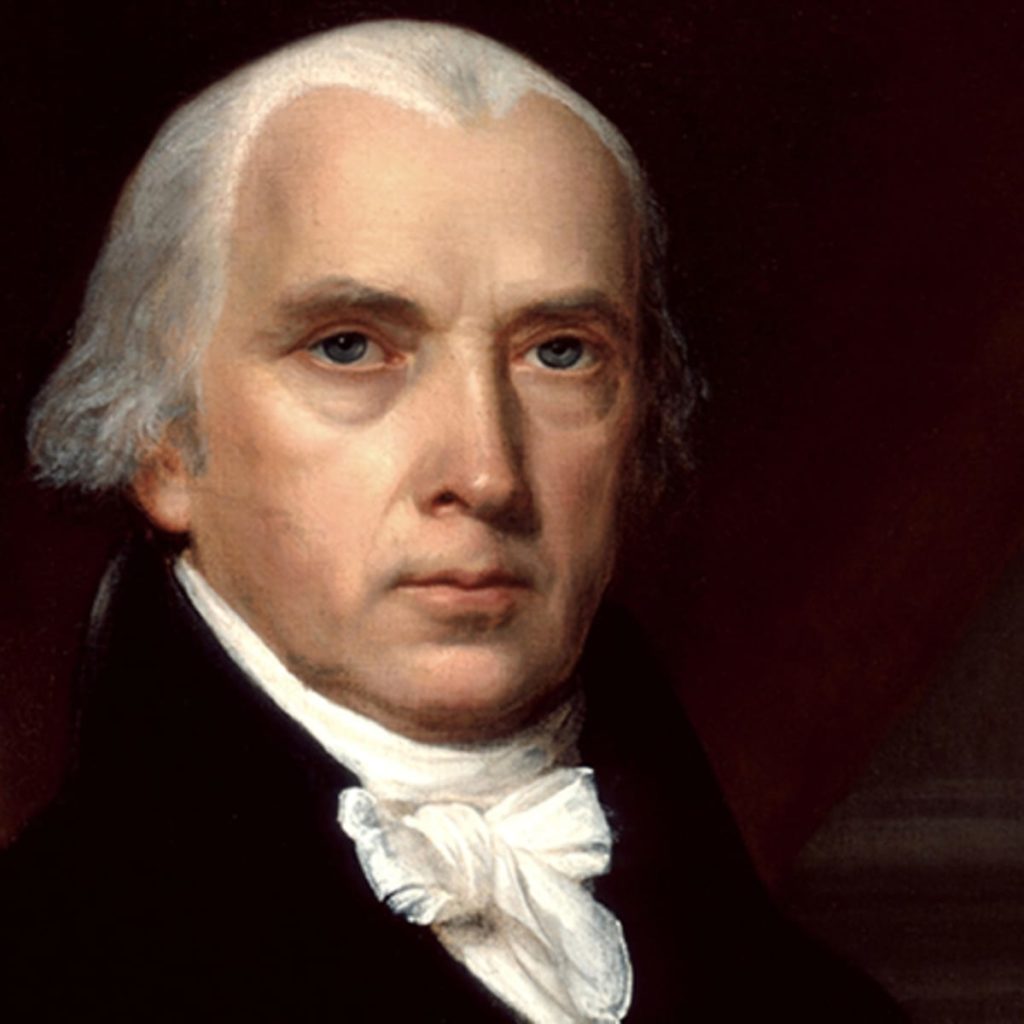
Delegates wanted to have a presidency powerful enough for its holder to do his job, but not too muscular a chief executive role. Hamilton and James McClurg of Virginia favored the president, absent misconduct, remaining in office indefinitely “upon good behavior,” even if for life. Mason recoiled. “An Executive during good behavior as a softer name only for an Executive for life,” he said. “And that the next would be an easy step to hereditary Monarchy.”
McClurg and Hamilton denied trying to create a monarchy or a dictatorship. According to McClurg, an executive had to be independent of Congress, unlike the relationship between many state legislatures and governors. “The Executives of the States are in general little more than Cyphers; the legislatures omnipotent,” Madison noted. Appointment for life might give a president the job security needed to stand toe to toe with Congress, but that approach too closely resembled monarchy, and delegates rejected it. Under the Constitution, only Supreme Court justices and federal judges serve for life “during good Behaviour.”
The cudgel of impeachment offered leverage against presidential power, delegates felt. “Shall any man be above Justice?” Mason asked. “Above all shall that man be above it, who can commit the most extensive injustice?” Morris thought likewise, fearing especially the corrupting taint of bribery. “No one would say that we ought to expose ourselves to the danger of seeing the first Magistrate in foreign pay without being able to guard agst. it by displacing him,” he said.
The thought of a Congress authorized to impeach unsettled delegates. Pinckney feared that Congress could use the threat of charges “as a rod over the Executive and by that means effectually destroy his independence.” Not so, said Gerry. “A good magistrate will not fear them,” the Massachusetts man said. “A bad one ought to be kept in fear of them.”
Delegates denatured the impeachment factor by diluting the definition of impeachable conduct. Initially, Congress could have removed a president for “malpractice or neglect of duty.” But the final draft permitted impeachment only for “Treason, Bribery, or other high Crimes and Misdemeanors.” This pivot shifted focus from how well a president did the job, which could have made impeachment a political sideshow, to whether he had broken the law.
Presidential re-election mattered, delegates concluded. “If he behaves well he will be continued,” Sherman noted. “If otherwise, displaced on a succeeding election.” Denying the possibility of successive terms, Morris argued, would “destroy the great motive to good behavior, the hope of being rewarded by a re-appointment. It was saying to him, make hay while the sun shines.” William R. Davie of North Carolina predicted that a president would “spare no efforts or means whatever to get himself re-elected…an essential security for the good behavior of the Executive.” A majority of delegates agreed, and as a result, the Constitution permitted a president to run for re-election as often as he wished. Not until ratification of the 22nd Amendment in 1951 was the executive limited to two terms.
So presidents turned out of office would return to civilian life—an ignominious event? Not to Franklin. “It seems to have been imagined by some that the returning to the mass of the people was degrading the magistrate,” he noted. “In free Governments the rulers are the servants, and the people their superiors & sovereigns. For the former therefore to return among the latter was not to degrade but to promote them—and it would be imposing an unreasonable burden on them, to keep them always in a State of servitude, and not allow them to become again one of the Masters.”
The delegates were inventing a lexicon as well as a government. “The United States of America,” “the president,” “the Senate,” and “the House of Representatives” and other phrases that easily roll off today’s tongue were not commonplace in 1787. Under the Articles of Confederation, the country had called itself “the United States of America.” At the convention, advocates tried out “the United People and States of America.” Delegates kept the original. They referred to the country’s leader as the Supreme Executive, the Executive Magistrate, the Chief Magistrate, and the First Magistrate. A proposal would have had him addressed as “His Excellency.” The House of Representatives narrowly avoided becoming the House of Delegates, and collective references to House and Senate labeled the bicameral legislature “U.S. in Congress Assembled.” The names we now use were inserted by the Committee of Details, the Convention’s wordsmiths, and adopted without debate.
On September 17, 1787, delegates had in hand a final draft, ready for signatures and circulation among the states for ratification. Most delegates had a bone or two to pick. Rumblings that some would balk at signing had Franklin smoothing feathers. Under the circumstances, he said, the Convention had done a remarkable job. “For when you assemble a number of men to have the advantage of their joint wisdom, you inevitably assemble with those men, all their prejudices, their passions, their errors of opinion, their local interests, and their selfish views,” Franklin said. “From such an Assembly can a perfect production be expected?” He urged forbearance. “I cannot help expressing a wish that every member of the Convention who may still have objections to it, would with me, on this occasion doubt a little of his own infallibility,” Franklin said. “And to make manifest our unanimity, put his name to this instrument.”
Franklin’s words reverberated in the meeting room. Others echoed him. “No man’s ideas were more remote from the plan than his own were known to be,” Hamilton said. “But is it possible to deliberate between anarchy and Convulsion on one side, and the chance of good to be expected from the plan on the other.” Of the 42 delegates still in Philadelphia, all but three signed. The Constitution became law on June 21, 1788, when New Hampshire became the ninth state to ratify.
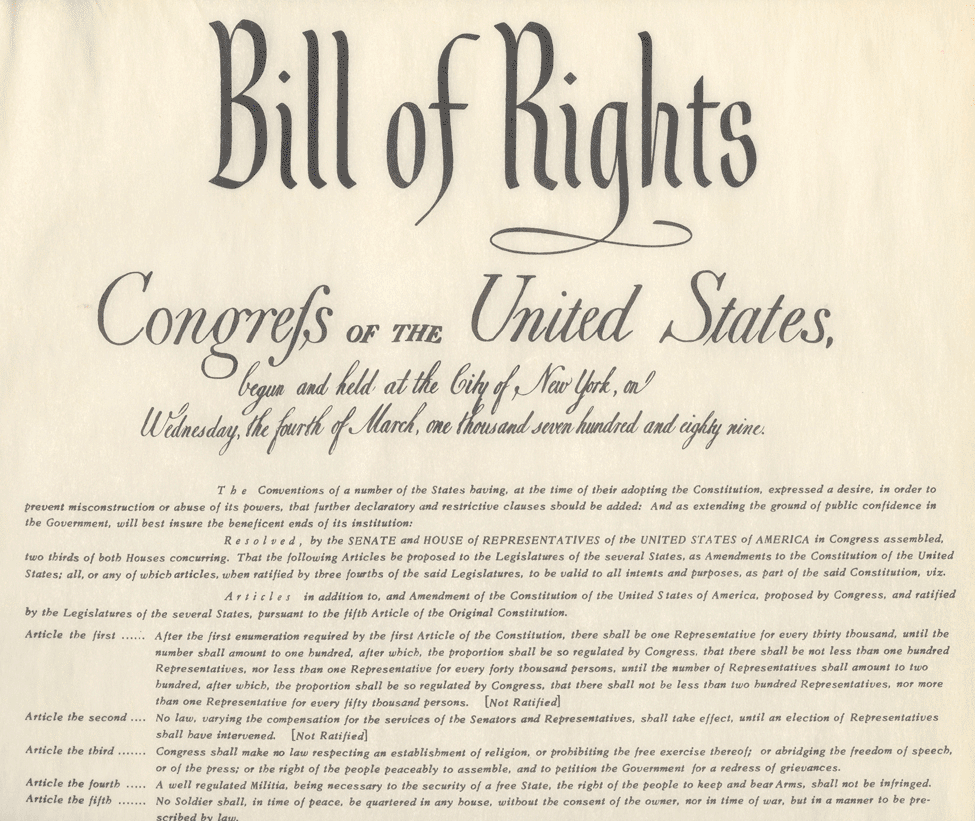
For the Convention’s first 14 weeks, delegates paid scant attention to individual rights. On September 12, with the conclave about to end, Mason, author of Virginia’s Declaration of Rights, suggested a federal Bill of Rights to “give great quiet to the people.” Guarantees in state constitutions sufficed, Sherman declared. Perhaps not wanting to dive into a bramble patch, delegates spurned Mason’s suggestion. But during ratification, several states objected to the Constitution’s lack of guarantees regarding personal liberty. So did Jefferson. “A bill of rights is what the people are entitled to against every government on earth, general or particular, and what no just government should refuse, or rest on inference,” he wrote.
When Congress convened in 1789, Madison, now a representative from Virginia, pushed for a Bill of Rights. Others thought he was tinkering too soon. “I shall like to stand on the sure ground of experience, and not be treading air,” said Rep. James Jackson of Georgia. “What experience have we had of the good or bad qualities of this constitution?” Madison countered that speed was crucial “to quiet that anxiety which prevails in the public mind” and secure the people’s civil liberties, “which they consider as not sufficiently guarded.” On September 26, 1789, Congress passed the amendments comprising the Bill of Rights, and sent them to the states for ratification. The Bill of Rights became law on December 15, 1791, when Virginia became the 11th state to ratify. When these 10 amendments became law, Massachusetts, Connecticut, and Georgia had not yet ratified them and, did not do so until 1939, nearly 150 years later.
This story from American History was posted at Historynet.com on June 4, 2020.

